国际学术会议常用语(英语)
- 格式:doc
- 大小:29.06 KB
- 文档页数:5

国际会议发言开场白国际会议发言开场白【篇一:英文学术报告开场白、结束语】問侯語或開場白的寒喧(greetings)開場白很重要,最常用的問候是“ladies and gentlemen”,但要視場合而定。
例如在會議討論會場合時,經由主席介紹上台時可先說mr.chairman,honorable guest,ladies and gentlemen,good morning ,its very great pleasure indeed for me to be able to attend this meeting主席先生,各位貴賓,各位女士,先生早安.非常榮幸能參加這次的會議。
或者你也可以說im hornored and proud to have the opportunity to speak at this meeting .禮貌性的問侯語這是對主持人和來賓的一種尊重。
開始簡報(opening a presentation)—提出簡報摘要在正式進入主題之前可先扼要說明簡報的內容與順序,幫助聽眾了解您的報告的大概內容。
例1.today i would like to present my paper“the challenges of pharmacy practice in taiwan”,in the first part of the report ,im going to begin with a few general comments concerning the taiwan medical care enviroment recently, and then discuss in more detail specific issue which concerned community pharmacy, and how the national health cave insurance influence the future of pharmacist career?例2.你亦可將要簡報的摘要條列式的依序說明。

学术会议常用表达1. 有关会议的一般信息(1)名称conference academic conference international conference symposium annual meeting/symposium/conference forum, international forum workshop(2)日期dates/important dates/key dates(3)地点location/venue conference location/venue(4)主题issues/themes/(main)topics/scope of conference conference themes/topicstopic of interests2.论文征稿、提交与录用call for abstract/proposal/paper paper deadlinedeadline for abstract/full paper/proposal submissionsubmission deadline deadline extendeddate for mortification of acceptance Paper acceptance/rejection will be informed by…deadline for authors notification camera ready version deadline3. 会议注册deadline/closing date for registration registration form registration information registration fees and items official invitation letter payment telegraphic transfer only bank transfer bank draft/check4. 会议进程及内容conference schedule/program preliminary conference programfinal conference program opening ceremony/sessionkeynote session/parallel session/tutorial session keynote speechoral presentation poster presentation tea/coffee break (buffet) lunch/(buffet)supper(welcome)banquet5. 会议具体细节opening introduction to speaker theme/paper presentation question and answer comment on speaker closing6.学术会议的问答讨论环节口语学术报告之后的问答讨论环节(Question and Answer Session)是同行之间交流的良好机会,双方可以针对报告中的具体问题进行探讨(1)答问的方式与技巧回答讨论环节可以让报告人通过互动及时地获得信息反馈并可以把在讨论中或得的建设性建议用于下一步的工作,因此对科研工作有很大的促进作用。
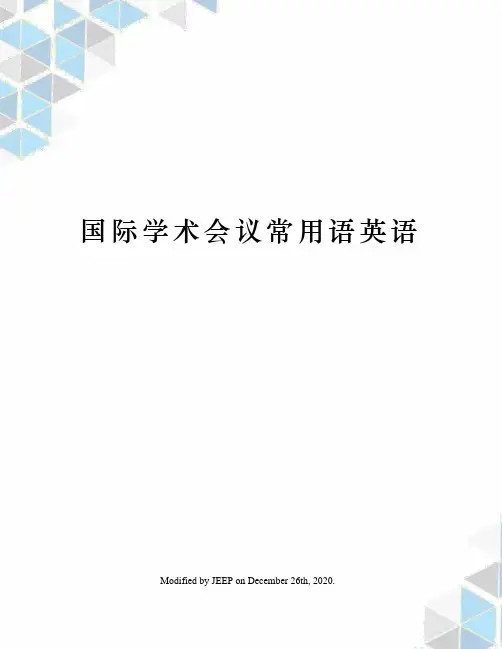
国际学术会议常用语英语 Modified by JEEP on December 26th, 2020.学术会议常用表达1. 有关会议的一般信息(1)名称conference academic conference international conferencesymposiumannual meeting/symposium/conference forum, international forum workshop(2)日期dates/important dates/key dates(3)地点location/venue conference location/venue(4)主题issues/themes/(main)topics/scope of conference conference themes/topicstopic of interests2.论文征稿、提交与录用call for abstract/proposal/paper paper deadline deadline for abstract/full paper/proposal submissionsubmission deadline deadline extended date for mortification of acceptance Paper acceptance/rejection will be informed by…deadline for authors notification camera ready version deadline3. 会议注册deadline/closing date for registration registration form registration informationregistration fees and items official invitation letterpaymenttelegraphic transfer only bank transferbank draft/check4. 会议进程及内容conference schedule/program preliminary conference program final conference program opening ceremony/session keynote session/parallel session/tutorial session keynote speechoral presentation poster presentationtea/coffee break(buffet) lunch/(buffet)supper (welcome)banquet5. 会议具体细节opening introduction to speakertheme/paper presentationquestion and answer comment on speaker closing6.学术会议的问答讨论环节口语学术报告之后的问答讨论环节(Question and Answer Session)是同行之间交流的良好机会,双方可以针对报告中的具体问题进行探讨(1)答问的方式与技巧回答讨论环节可以让报告人通过互动及时地获得信息反馈并可以把在讨论中或得的建设性建议用于下一步的工作,因此对科研工作有很大的促进作用。
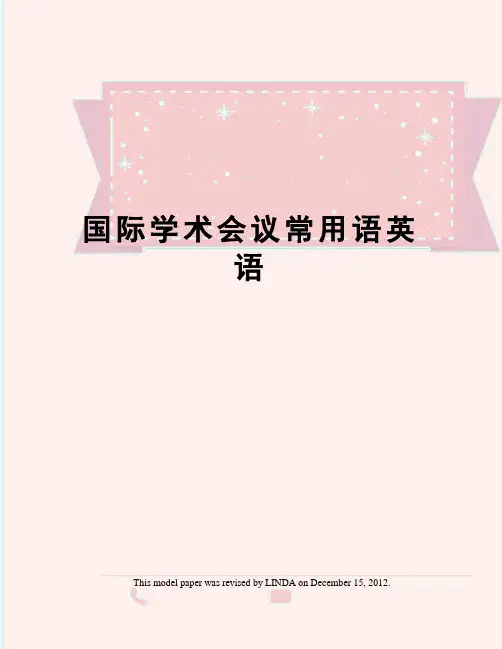
国际学术会议常用语英语This model paper was revised by LINDA on December 15, 2012.学术会议常用表达1. 有关会议的一般信息(1)名称conference academic conference international conference symposiumannual meeting/symposium/conference forum, international forum workshop(2)日期dates/important dates/key dates(3)地点location/venue conference location/venue(4)主题issues/themes/(main)topics/scope of conference conference themes/topics topic of interests2.论文征稿、提交与录用call for abstract/proposal/paper paper deadlinedeadline for abstract/full paper/proposal submissionsubmission deadline deadline extendeddate for mortification of acceptance Paper acceptance/rejectionwill be informed by…deadline for authors notification camera ready version deadline3. 会议注册deadline/closing date for registration registration form registration informationregistration fees and items official invitation letter paymenttelegraphic transfer only bank transferbank draft/check4. 会议进程及内容conference schedule/program preliminary conference programfinal conference program opening ceremony/session keynote session/parallel session/tutorial sessionkeynote speechoral presentation poster presentationtea/coffee break(buffet) lunch/(buffet)supper (welcome)banquet5. 会议具体细节opening introduction to speakertheme/paper presentationquestion and answer comment on speakerclosing6.学术会议的问答讨论环节口语学术报告之后的问答讨论环节(Question and Answer Session)是同行之间交流的良好机会,双方可以针对报告中的具体问题进行探讨(1)答问的方式与技巧回答讨论环节可以让报告人通过互动及时地获得信息反馈并可以把在讨论中或得的建设性建议用于下一步的工作,因此对科研工作有很大的促进作用。
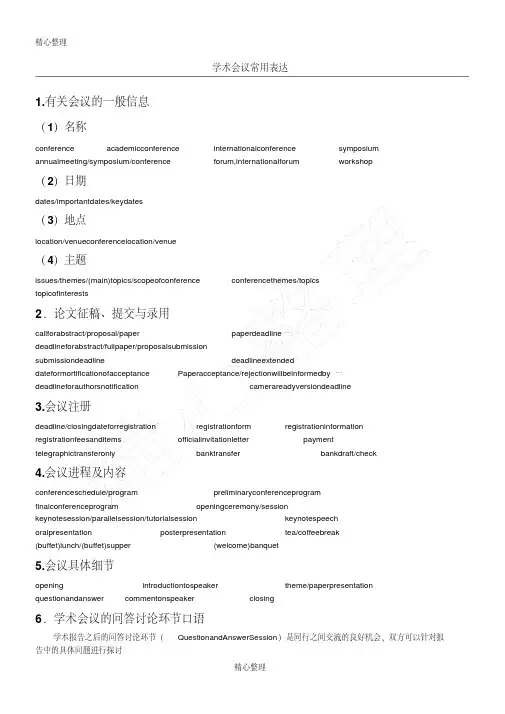
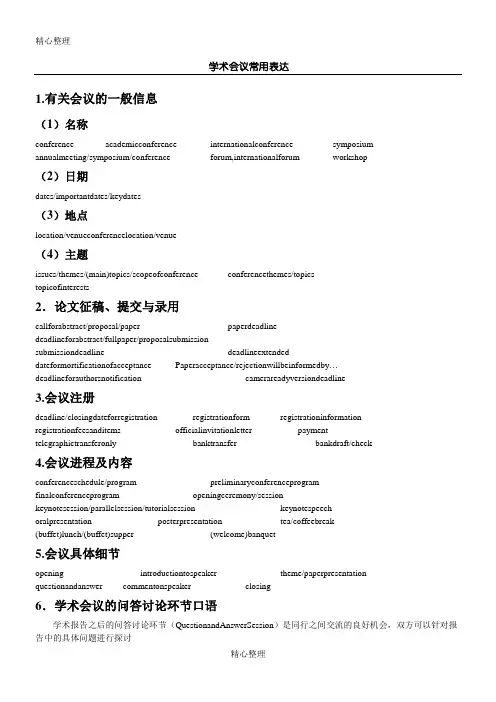
学术会议常用表达1.有关会议的一般信息(1)名称conference academicconference internationalconference symposiumannualmeeting/symposium/conference forum,internationalforum workshop(2)日期(3(423.4.keynotesession/parallelsession/tutorialsession keynotespeechoralpresentation posterpresentation tea/coffeebreak(buffet)lunch/(buffet)supper (welcome)banquet5.会议具体细节opening introductiontospeaker theme/paperpresentation questionandanswer commentonspeaker closing6.学术会议的问答讨论环节口语学术报告之后的问答讨论环节(QuestionandAnswerSession)是同行之间交流的良好机会,双方可以针对报告中的具体问题进行探讨(1)答问的方式与技巧回答讨论环节可以让报告人通过互动及时地获得信息反馈并可以把在讨论中或得的建设性建议用于下一步的工作,因此对科研工作有很大的促进作用。
对于如此重要的环节,报告人在报告之前应进行必要的准备,尽可能地保证这一环节完整、流畅地进行,一般应注意以下几点。
①准备工作学术报告中的提问者往往是相关领域中的专家,对报告的内容非常熟悉,因此所提出的问题可能会有相当的深度、广度以及不可预见性,有时甚至直接指出研究工作中的不完善之处或漏洞所在。
由于时间关系,回答者在现场一般没有充分的时间进行考虑,这就要求报告人要事先进行充分的准备。
在报告前,报告人应将对答环节的准备作为准备工作的一部分,进行深入考虑,全面的预测听众可能提出的问题,可以假设一些问题,并准备好最合适的解答。
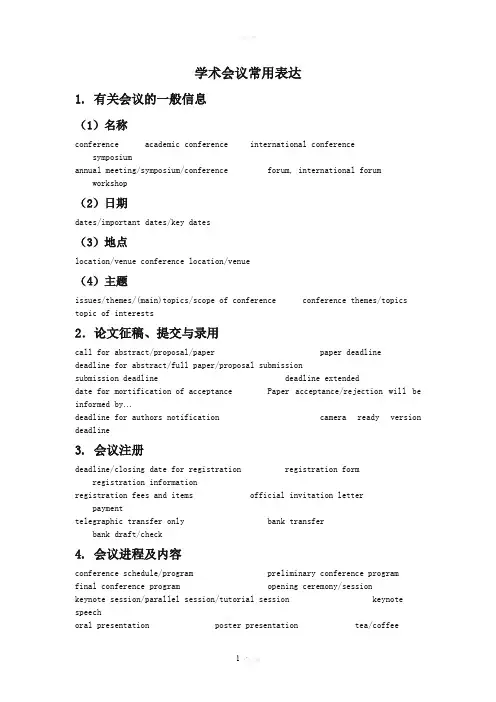
学术会议常用表达1. 有关会议的一般信息(1)名称conference academic conference international conference symposiumannual meeting/symposium/conference forum, international forum workshop(2)日期dates/important dates/key dates(3)地点location/venue conference location/venue(4)主题issues/themes/(main)topics/scope of conference conference themes/topics topic of interests2.论文征稿、提交与录用call for abstract/proposal/paper paper deadlinedeadline for abstract/full paper/proposal submissionsubmission deadline deadline extendeddate for mortification of acceptance Paper acceptance/rejection will be informed by…deadline for authors notification camera ready version deadline3. 会议注册deadline/closing date for registration registration form registration informationregistration fees and items official invitation letter paymenttelegraphic transfer only bank transferbank draft/check4. 会议进程及内容conference schedule/program preliminary conference programfinal conference program opening ceremony/sessionkeynote session/parallel session/tutorial session keynote speechoral presentation poster presentation tea/coffeebreak(buffet) lunch/(buffet)supper (welcome)banquet5. 会议具体细节opening introduction to speaker theme/paper presentationquestion and answer comment on speaker closing6.学术会议的问答讨论环节口语学术报告之后的问答讨论环节(Question and Answer Session)是同行之间交流的良好机会,双方可以针对报告中的具体问题进行探讨(1)答问的方式与技巧回答讨论环节可以让报告人通过互动及时地获得信息反馈并可以把在讨论中或得的建设性建议用于下一步的工作,因此对科研工作有很大的促进作用。
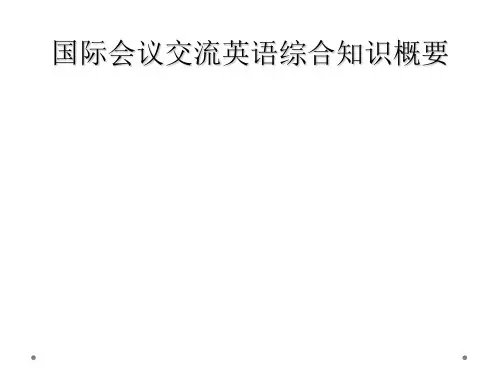
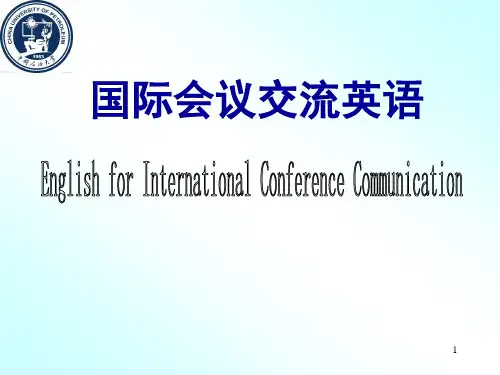
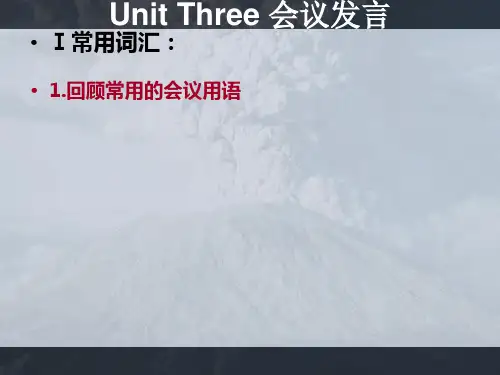

英语知识Sesion(英),Meting(美)会议Agenda 议程Rules of Procedure 议事规则Minute,会议记录Verbatim Report 速记记录Appendix,Annex 附件,附录Study, Consideration研究,审议To draw the attention of 提请注意Suggest, Suggestion 建议,建议案Proposal 提案Point of order 程序问题Resolution 决议Decision 决定本文由天译时代翻译公司整理发布。
天译时代翻译公司是一家大型的语言服务提供商,专注于会议口译翻译(包括法律会议口译、学术会议口译、发布会口译等会议翻译服务),详情请咨询会议口译服务热线:400-080-1181.作为一个会议口译译员,应该全面发展,不仅能搞同声传译工作,也要能搞即席传译工作,二者缺一不可。
由于同声传译比即席传译更加容易学习和掌握(这点恐怕同很多人的想象相反),所以,作为初学者,在掌握即席传译技术以前,最好先搞一段时间的同声传译工作。
也就是说,应该先到只使用同声传译的会议上去工作。
但是,在实际工作中,这种只使用同声传译的会议是很少的。
由于工作需要,绝大多数会议总免不了要建立若干个委员会、工作组、起草组等附属机构。
这些机构往往在没有同声传译设备的小会议室里开会,这就需要进行即席传译了。
遇到这种情况,所有搞同声传译工作的译员,都可能被抽调到这些附属机构中去担任即席传译工作。
如果某些人做不到这一点,那么他们的那份工作就要不合理地落到他们的同事身上,给别人增加负担。
所以,在大学的翻译系或翻译学校里,都把同声传译和即席传译的全面发展作为培养学生的标准,达不到这一标准,就不能取得毕业证书。
此外,译员为了保证自己的工作顺利进行,还必须根据自己的兴趣爱好开展适当的业余活动,如体育运动、娱乐游戏、从事业余研究和写作等。
只有这样,他才能有健康的身体和饱满的精神,以胜任口译这一高度紧张的脑力劳动工作。
英语国际会议交流用语一、开幕式中,宣布开幕、欢迎词及贺词。
(1)Mr President of the Congress, President A and distingu ished guests:尊敬的大会的主席先生,会长A和贵宾们。
(2)Dr. (Professor) A, Dr. (Professor) B, ladies and gen tlemen.A博士(教授)、B博士(教授),女士们,先生们。
(3)Mr. Chairman, fellow delegates, friends. 主席先生、同仁们、朋友们。
2 宣布开会。
(4)I am very pleased and honored to declare(the confer ence)open.我很高兴和荣幸地宣布···开幕。
3 来宾在开幕式上致辞。
(5)I am greatly honored to give the opening address/spe ech at this···(3rd) International Congress of ABC here in Beijin g我深感荣幸在北京举办的第···次ABC国际大会上致开幕词。
4 主办单位对参会者致欢迎词。
(6)On behalf of the ABC society, I am delighted to we lcome all of you to the ···(1st) International Symposium of XYZ.我很高兴代表ABC学会欢迎你们所有的人来参加第···届XYZ国际学术会议。
(7)You have come all the way for this conference. Than k you very much for your attention/participation.你们远道而来参加会议。
国际学术会议常用语(英语)学术会议常用表达1. 有关会议的一般信息(1)名称conference academic conference international conference symposium annual meeting/symposium/conference forum, international forum workshop (2)日期dates/important dates/key dates(3)地点location/venue conference location/venue(4)主题issues/themes/(main)topics/scope of conference conference themes/topicstopic of interests2.论文征稿、提交与录用call for abstract/proposal/paperpaper deadlinedeadline for abstract/full paper/proposal submissionsubmission deadline deadline extended5. 会议具体细节opening introduction to speaker theme/paper presentationquestion and answer comment on speaker closing6.学术会议的问答讨论环节口语学术报告之后的问答讨论环节(Question and Answer Session)是同行之间交流的良好机会,双方可以针对报告中的具体问题进行探讨(1)答问的方式与技巧回答讨论环节可以让报告人通过互动及时地获得信息反馈并可以把在讨论中或得的建设性建议用于下一步的工作,因此对科研工作有很大的促进作用。
对于如此重要的环节,报告人在报告之前应进行必要的准备,尽可能地保证这一环节完整、流畅地进行,一般应注意以下几点。
国际会议英语口语 100 句一、开幕式中,宣布开幕、欢迎词及贺词。
(1)Mr President of the Congress, President A and distinguished guests:尊敬的大会的主席先生,会长A和贵宾们。
(2)Dr. (Professor) A, Dr. (Professor) B, ladies and gentlemen. A博士(教授)、 B 博士(教授),女士们,先生们。
(3)Mr. Chairman, fellow delegates, friends.主席先生、同仁们、朋友们。
2宣布开会。
(4)I am very pleased and honored to declare • • , (the conference) open. 我很高兴和荣幸地宣布・・•开幕。
3来宾在开幕式上致辞。
(5)I am greatly honored to give the opening address/speech at this • • , (3rd ) International Congress of ABC here in Beijing 我深感荣幸在北京举办的第•一次 ABC国际大会上致开幕词。
4主办单位对参会者致欢迎词。
(6)On behalf of the ABC society, I am delighted to welcome all of you to the • • , (1st) International Symposium of XYZ.我很高兴代表ABC学会欢迎你们所有的人来参加第・・・届XYZ国际学术会议。
(7)You have come all the way for this conference. Thank you very much for your attention/participation. 你们远道而来参加会议。
Good morning! It is a great pleasure to be here at this International Academic Conference and have the opportunity to share my thoughts and insights with all of you. Today, I would like to focus on the topic of "The Impact of Artificial Intelligence on Education in the 21st Century".As we all know, the 21st century is a century of rapid development and innovation, and artificial intelligence (AI) is one of the most significant advancements in this era. The integration of AI into various fields has brought about profound changes, and education is no exception. In this speech, I will discuss the following aspects: the definition and development of AI, the impact of AI on education, and the challenges and opportunities it presents.Firstly, let's talk about the definition and development of AI.Artificial intelligence refers to the simulation of human intelligenceby machines, which can perceive, reason, learn, and make decisions. The development of AI can be traced back to the 1950s when John McCarthy, an American computer scientist, first proposed the concept of AI. Since then, AI has undergone several stages of development, including thebirth of AI, the crisis of AI, the renaissance of AI, and the current rapid development of AI.In the field of education, AI has been applied in various aspects, such as intelligent teaching, intelligent assessment, and personalized learning. Intelligent teaching refers to the use of AI technology to design and implement teaching plans, which can adapt to the needs of different students. Intelligent assessment uses AI algorithms toevaluate students' learning progress and provide timely feedback. Personalized learning refers to the use of AI technology to create individualized learning plans for students, enabling them to learn at their own pace and in their own style.Secondly, let's discuss the impact of AI on education. On the one hand, AI has greatly improved the efficiency and effectiveness of education. With the help of AI, teachers can focus on guiding students' learningand developing their thinking abilities, instead of spending time on repetitive tasks such as grading. Students can also benefit from AI technology by obtaining more personalized and targeted learningresources. On the other hand, AI has brought about new challenges to education. For example, the rapid development of AI technology may lead to a decline in the importance of human teachers, and the increasing use of AI in education may cause students to lose the opportunity to communicate and interact with their peers.Thirdly, let's explore the challenges and opportunities presented by AI in education. Challenges include the following aspects:1. The quality of AI technology: As AI technology continues to develop, the quality of AI products will also vary. In the field of education,the use of low-quality AI products may have a negative impact onstudents' learning.2. The digital divide: In the process of integrating AI into education, the digital divide may become more prominent. Students from disadvantaged backgrounds may not have access to high-quality AI resources, which will further widen the gap between students.3. Ethical issues: The use of AI in education raises ethical issues,such as the protection of students' personal information and the prevention of AI bias.Opportunities include the following aspects:1. Innovation in education: AI technology can promote the innovation of educational methods, teaching materials, and assessment methods, and improve the overall quality of education.2. Improvement of educational equity: AI technology can help to break through the barriers of time and space, making high-quality education resources more accessible to students from all over the world.3. Development of educational talent: AI technology can provide students with more personalized and targeted learning experiences, helping themto develop their unique talents and potential.In conclusion, the impact of AI on education is both profound and complex. While AI technology has brought about significant benefits to education, it also presents new challenges. As educators and researchers,we need to actively explore and solve these challenges, and seize the opportunities brought by AI technology to promote the development of education in the 21st century.Thank you for your attention, and I look forward to your comments and suggestions.。
学术会议常用表达1. 有关会议的一般信息(1)名称conference academic conference international conference symposiumannual meeting/symposium/conference forum, international forum workshop(2)日期dates/important dates/key dates(3)地点location/venue conference location/venue(4)主题issues/themes/(main)topics/scope of conference conference themes/topics topic of interests2.论文征稿、提交与录用call for abstract/proposal/paper paper deadlinedeadline for abstract/full paper/proposal submissionsubmission deadline deadline extendeddate for mortification of acceptance Paper acceptance/rejection will be informed by…deadline for authors notification camera ready version deadline3. 会议注册deadline/closing date for registration registration form registration informationregistration fees and items official invitation letter paymenttelegraphic transfer only bank transferbank draft/check4. 会议进程及容conference schedule/program preliminary conference programfinal conference program opening ceremony/sessionkeynote session/parallel session/tutorial session keynote speechoral presentation poster presentation tea/coffeebreak(buffet) lunch/(buffet)supper (welcome)banquet5. 会议具体细节opening introduction to speaker theme/paper presentationquestion and answer comment on speaker closing6.学术会议的问答讨论环节口语学术报告之后的问答讨论环节(Question and Answer Session)是同行之间交流的良好机会,双方可以针对报告中的具体问题进行探讨(1)答问的方式与技巧回答讨论环节可以让报告人通过互动及时地获得信息反馈并可以把在讨论中或得的建设性建议用于下一步的工作,因此对科研工作有很大的促进作用。
对于如此重要的环节,报告人在报告之前应进行必要的准备,尽可能地保证这一环节完整、流畅地进行,一般应注意以下几点。
①准备工作学术报告中的提问者往往是相关领域中的专家,对报告的容非常熟悉,因此所提出的问题可能会有相当的深度、广度以及不可预见性,有时甚至直接指出研究工作中的不完善之处或漏洞所在。
由于时间关系,回答者在现场一般没有充分的时间进行考虑,这就要求报告人要事先进行充分的准备。
在报告前,报告人应将对答环节的准备作为准备工作的一部分,进行深入考虑,全面的预测听众可能提出的问题,可以假设一些问题,并准备好最合适的解答。
如果会议没有统一安排每个报告的问答环节,报告者在进行报告时就要预先告知听众随后的Q&A Session,这样可以让听众为提问做好准备。
②过程控制在时间允许的情况下尽可能让每个想提问的人都有机会提问,不要让少数提问者的提问占据整个讨论环节,应按照提问者举手示意的顺序来请出提问者。
在开始回答问题时,首先与提问者目光接触,然后转向其他所有听众,这样可以获得所有听众的注意。
在回答完毕之后,可以再次通过目光了解提问者是否对回答表示满意。
报告人应控制整个讨论的过程,对于与主题无关的问题可以礼貌地回避。
③答问方式应首先仔细听清问题,在回答之前应将问题清楚的重复一遍,这可以保证对问题的正确理解,确保每个人都能听清楚问题,同时给自己一些时间来思考,表述答案前可做片刻停留,这既引起了听众的注意,又表明了对答案的谨慎态度,同时也给自己留更多的思考空间。
不要对问题进行评价,避免说类似“That was a great question”的话,如果想要对某一问题进行肯定,可以用“Thanks for asking that question”或“I get asked that question by many people.”等中性的表述,还可以让听众感到平等。
回答问题时应尽可能简洁,切题。
在回答中应尽可能多地提及报告中的容,这有利于听众对报告容加深印象,并有利于控制问答环节的主题。
④问题的类型对于寻求具体解释的一些问题,可以简单地重复报告的容来对问题进行说明或证明,或是澄清听众的误解。
如果提问者对报告容提出不同见解,可以通过资料、事实、数据等来证明自己的观点,但一定注意态度要礼貌谦和。
对于过于复杂的深层问题无法进行简单回答时,可以在简略回答之后邀约提问者在其他时间进行讨论。
对于听众的评价或是建议应表示感,但要控制时间,适时地打断发言人并转入下一个问题。
对不知道答案的问题应坦率的承认,不要回避或转换话题,并尽可能提供相关的书籍,资料或是该方面的专家以供参考。
⑤时间的把握为了能够巧妙地结束回答问题环节,可事先准备一段总结性的述用来重申报告主题并结束问答环节。
注意在达到规定时间时应立刻结束讨论环节,在回答最后一个问题之前们就要礼貌地表示即将超时,并可以让其他提问者将问题留在会后进行讨论。
⑥提问者的礼仪大型会议中回答环节的时间往往比较短暂,提问者应抓住机会参与讨论,同时应注意以下方面。
如果为提问者准备了麦克风,则应在拿到麦克风后等待阿加安静下来在进行提问;大声地表述,让提问者和听众都能够听清楚问题;不必解释提问的理由以免浪费时间,但如果适宜可以需要地介绍自己(一定要简要);对所提的问题应做好准备,以保证问题的有效性(不要提那些答案显而易见的问题)提问务必简短;每次尽量只提一个问题,把更多的机会留给其他听众。
(2)常用表达①提问I would like to ask/address/raise a question about…I would like to know(whether)…I would be glad to know(whether)…I have a question about…May I ask (a question about)…?My question is/concerns//is concerned with…What I would like to ask is…What I am asking is …I wonder if you would like to explain/comment on the point of…I would be grateful/appreciate/obliged/for(to have) some explanation about…I wonder if you would be kind enough to explain/comment on/give some example for…I wonder (What I am wondering is)…I am curious about/interested in/keen on(whether/why/how/what/when)…?Could you please tell me whether/why/how/what/when…?Do you mind showing me whether/why/how/what/when…?I could not understand what you really mean by…Do you have any ideas about…?What do you think of/about…?Could you back…up?Could you give us an example about…?Could you provide any example to prove what you have said about…?Could you give any example that shows…?②回答a. 对问题进行确认Are you asking me the question about…?I am not quite about the question? Do you mean…?I am not quite sure what your question is. Could you address your question more specifically?What do you mean by…?I don’t known whether I have understood your question correctly. Do you mean….?b.肯定会否定的表示Yes. /I do.The answer is (not) correct/true/right…Exactly!Precisely!I think so.I think you’re right.I don’t think so.That is just what I mean.That is not what I mean.I (don’t) believe/consider/suppose/regard the viewpoint is true.Sure. /Absolutely. /Certainly. /Definitely.No, (absolutely/certainly/definitely) not.I’m in complete agreement.I (quite) agree.I couldn’t agree more.c. 正面回答My answer(to the question) is…To answer this question, I would like to say that…The direct/simple/brief answer to the question is…Let me answer your question by same examples of…I’d like to make a few comments on/explanation about…I think I can give you a few general comments on/explanation about…To comment on the question of you, I have made comparison between… and…I’d like to present/offer/give/express/state my opinion on…In my opinion, the conclusion can be supported by the experimental result that…To answer your question, I’d like to repeat what I said just know.I think this picture will be helpful for your understanding.Here, I’d like to explain it briefly.My idea is on the basis of two points. The first is…, and the second is…I will explain by some examples.d.非正面回答Now I can only present same estimation about that…As far as I know, little in-depth research has bean carried out yet.I can only provide/I have only a partial answer to that question.That’s one possible explanation, but not the only one.I’m afraid it’s a bit difficult for me to present some experimental data at the moment to support the theory since my idea is mainly out of theoretical consideration.I’m afraid the question is too complicated to be answered with a few words. I’d like to discuss it with you after the session.I think the answer to the question needs some further study.I’m afraid is not within the field of the presentation.I’m not sure if what you’re saying has any relevance here.I’m not sure if what you’re saying has anything to do with our problem.I’m not sure if what you’re saying really matters in this case.I’m not sure if what you’re saying is relevant to our problem.e. 无法回答时的表述I’m sorry my experience/knowledge about your question is very limited so I think I cannot give a good answer to your question.I’m sorry I really don’t know the answer to the question.Unfortunately I cannot answer the question at the moment.I’m afraid I have no idea how to answer your question (about that).Sorry, I’m afraid I know little about that matter, so I don’t think I can answer your question right now.It’s quite difficult for me to answer that question now.I can’t really recall; I’ll have to get back to you on that.I can’t quite remember; I’ll need to do a little checking and get back to you.I can’t fully remember; I’ll have to check up on it.I can’t recall all the facts; I’ll have to get back to you.f.回答之后的表述I wonder whether my question is helpful to you.Does that answer your question in a right way?Is my explanation clear enough?Is that what you wanted me to answer?Would anyone like to and anything (to what I’ve said)?Would anyone care to comment?Would anyone like to give their ideas on this?Would anyone care to add their thoughts(to the discussion)?。